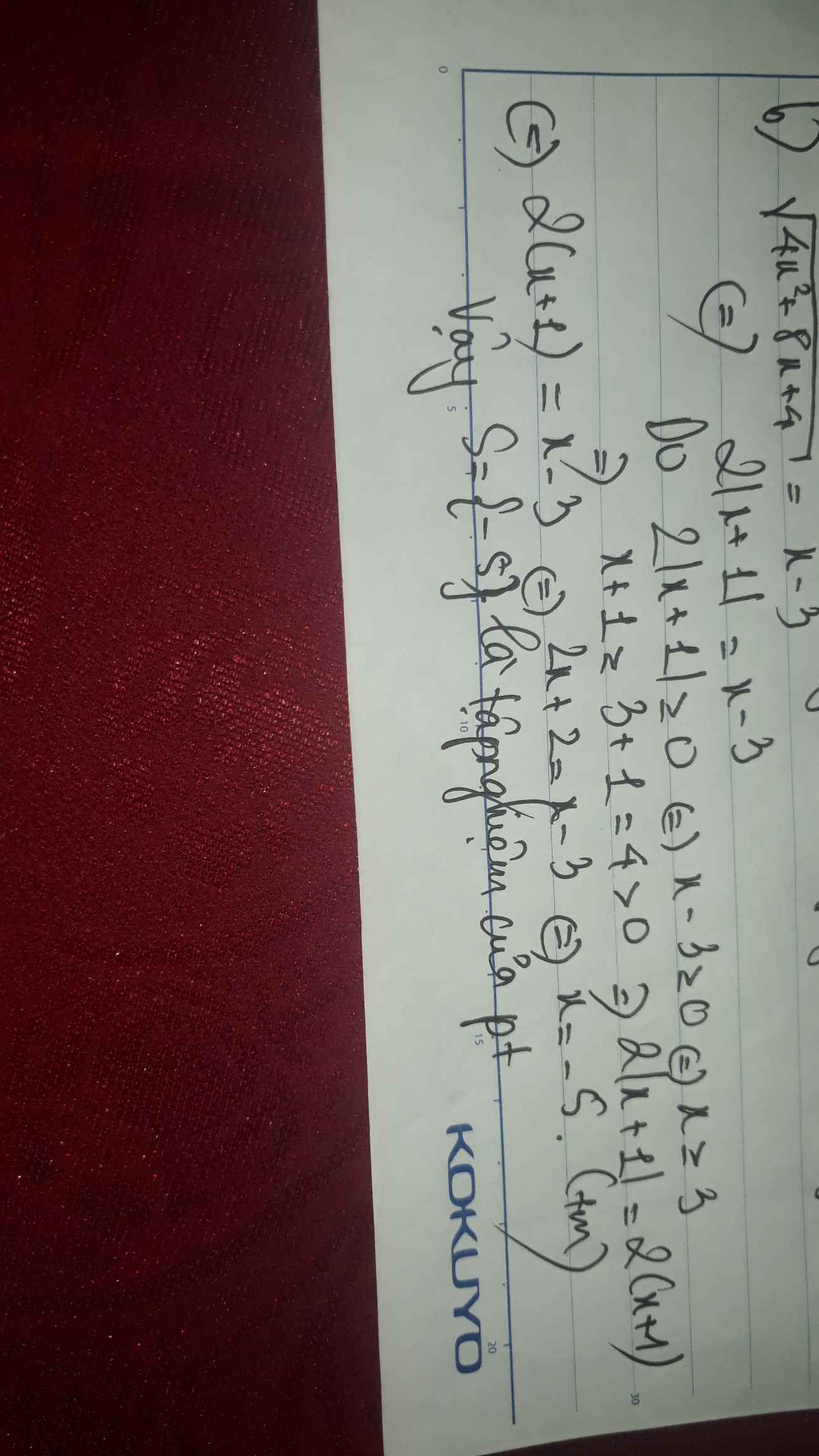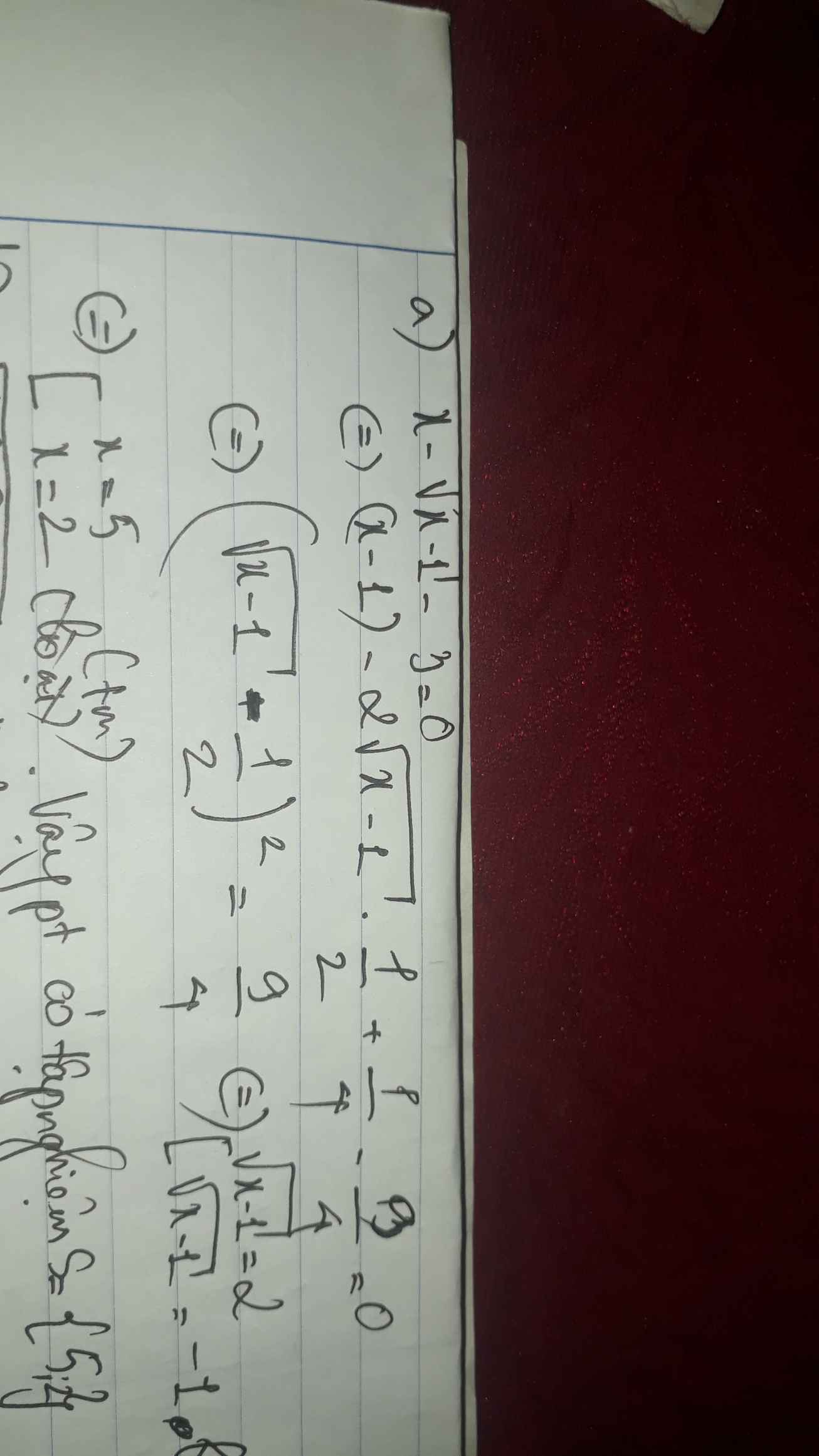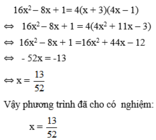giải phương trình: x^4+8x=4x^3+5
Hãy nhập câu hỏi của bạn vào đây, nếu là tài khoản VIP, bạn sẽ được ưu tiên trả lời.



a: \(x^3+8x=5x^2+4\)
=>\(x^3-5x^2+8x-4=0\)
=>\(x^3-x^2-4x^2+4x+4x-4=0\)
=>\(x^2\left(x-1\right)-4x\left(x-1\right)+4\left(x-1\right)=0\)
=>\(\left(x-1\right)\left(x^2-4x+4\right)=0\)
=>\(\left(x-1\right)\left(x-2\right)^2=0\)
=>\(\left[{}\begin{matrix}x-1=0\\\left(x-2\right)^2=0\end{matrix}\right.\Leftrightarrow\left[{}\begin{matrix}x=1\\x=2\end{matrix}\right.\)
2: \(x^3+3x^2=x+6\)
=>\(x^3+3x^2-x-6=0\)
=>\(x^3+2x^2+x^2+2x-3x-6=0\)
=>\(x^2\cdot\left(x+2\right)+x\left(x+2\right)-3\left(x+2\right)=0\)
=>\(\left(x+2\right)\left(x^2+x-3\right)=0\)
=>\(\left[{}\begin{matrix}x+2=0\\x^2+x-3=0\end{matrix}\right.\Leftrightarrow\left[{}\begin{matrix}x=-2\\x=\dfrac{-1+\sqrt{13}}{2}\\x=\dfrac{-1-\sqrt{13}}{2}\end{matrix}\right.\)
3: ĐKXĐ: x>=0
\(2x+3\sqrt{x}=1\)
=>\(2x+3\sqrt{x}-1=0\)
=>\(x+\dfrac{3}{2}\sqrt{x}-\dfrac{1}{2}=0\)
=>\(\left(\sqrt{x}\right)^2+2\cdot\sqrt{x}\cdot\dfrac{3}{4}+\dfrac{9}{16}-\dfrac{17}{16}=0\)
=>\(\left(\sqrt{x}+\dfrac{3}{4}\right)^2=\dfrac{17}{16}\)
=>\(\left[{}\begin{matrix}\sqrt{x}+\dfrac{3}{4}=-\dfrac{\sqrt{17}}{4}\\\sqrt{x}+\dfrac{3}{4}=\dfrac{\sqrt{17}}{4}\end{matrix}\right.\Leftrightarrow\left[{}\begin{matrix}\sqrt{x}=\dfrac{\sqrt{17}-3}{4}\left(nhận\right)\\\sqrt{x}=\dfrac{-\sqrt{17}-3}{4}\left(loại\right)\end{matrix}\right.\)
=>\(x=\dfrac{13-3\sqrt{17}}{8}\left(nhận\right)\)
4: \(x^4+4x^2+1=3x^3+3x\)
=>\(x^4-3x^3+4x^2-3x+1=0\)
=>\(x^4-x^3-2x^3+2x^2+2x^2-2x-x+1=0\)
=>\(x^3\left(x-1\right)-2x^2\left(x-1\right)+2x\left(x-1\right)-\left(x-1\right)=0\)
=>\(\left(x-1\right)\left(x^3-2x^2+2x-1\right)=0\)
=>\(\left(x-1\right)\left(x^3-x^2-x^2+x+x-1\right)=0\)
=>\(\left(x-1\right)^2\cdot\left(x^2-x+1\right)=0\)
=>(x-1)^2=0
=>x-1=0
=>x=1
a.
\(x^3+8x=5x^2+4\)
\(\Leftrightarrow x^3-5x^2+8x-4=0\)
\(\Leftrightarrow\left(x^3-4x^2+4x\right)-\left(x^2-4x+4\right)=0\)
\(\Leftrightarrow x\left(x-2\right)^2-\left(x-2\right)^2=0\)
\(\Leftrightarrow\left(x-1\right)\left(x-2\right)^2=0\)
\(\Rightarrow\left[{}\begin{matrix}x=1\\x=2\end{matrix}\right.\)
b.
\(x^3+3x^2-x-6=0\)
\(\Leftrightarrow\left(x^3+x^2-3x\right)+\left(2x^2+2x-6\right)=0\)
\(\Leftrightarrow x\left(x^2+x-3\right)+2\left(x^2+x-3\right)=0\)
\(\Leftrightarrow\left(x+2\right)\left(x^2+x-3\right)=0\)
\(\Rightarrow\left[{}\begin{matrix}x=-2\\x=\dfrac{-1\pm\sqrt{13}}{2}\end{matrix}\right.\)

Trả lời:
\(\frac{x-1}{2x^2-4x}-\frac{7}{8x}=\frac{5-x}{4x^2-8x}-\frac{1}{8x-16}\)\(\left(đkxđ:x\ne0;x\ne2\right)\)
\(\Leftrightarrow\frac{x-1}{2x\left(x-2\right)}-\frac{7}{8x}=\frac{5-x}{4x\left(x-2\right)}-\frac{1}{8\left(x-2\right)}\)
\(\Leftrightarrow\frac{4\left(x-1\right)}{8x\left(x-2\right)}-\frac{7\left(x-2\right)}{8x\left(x-2\right)}=\frac{2\left(5-x\right)}{8x\left(x-2\right)}-\frac{x}{8x\left(x-2\right)}\)
\(\Rightarrow4\left(x-1\right)-7\left(x-2\right)=2\left(5-x\right)-x\)
\(\Leftrightarrow4x-4-7x+14=10-2x-x\)
\(\Leftrightarrow10-3x=10-3x\)
\(\Leftrightarrow-3x+3x=10-10\)
\(\Leftrightarrow0x=0\)( luôn thỏa mãn )
Vậy S = R với \(x\ne0;x\ne2\)

a:Sửa đề: \(\dfrac{3}{5x-1}+\dfrac{2}{3-x}=\dfrac{4}{\left(1-5x\right)\left(x-3\right)}\)
=>3x-9-10x+2=-4
=>-7x-7=-4
=>-7x=3
=>x=-3/7
b: =>\(\dfrac{5-x}{4x\left(x-2\right)}+\dfrac{7}{8x}=\dfrac{x-1}{2x\left(x-2\right)}+\dfrac{1}{8\left(x-2\right)}\)
=>\(2\left(5-x\right)+7\left(x-2\right)=4\left(x-1\right)+x\)
=>10-2x+7x-14=4x-4+x
=>5x-4=5x-4
=>0x=0(luôn đúng)
Vậy: S=R\{0;2}

ĐKXĐ: \(x\ne0\)
Phương trình tương đương:
\(\dfrac{4}{4x-8+\dfrac{7}{x}}+\dfrac{3}{4x-10+\dfrac{7}{x}}=1\)
Đặt \(4x-10+\dfrac{7}{x}=t\)
\(\Rightarrow\dfrac{4}{t+2}+\dfrac{3}{t}=1\)
\(\Rightarrow4t+3\left(t+2\right)=t\left(t+2\right)\)
\(\Leftrightarrow t^2-5t-6=0\Rightarrow\left[{}\begin{matrix}t=-1\\t=6\end{matrix}\right.\)
\(\Rightarrow\left[{}\begin{matrix}4x-10+\dfrac{7}{x}=-1\\4x-10+\dfrac{7}{x}=6\end{matrix}\right.\)
\(\Rightarrow\left[{}\begin{matrix}4x^2-9x+7=0\left(vn\right)\\4x^2-16x+7=0\end{matrix}\right.\)
\(\Rightarrow\left[{}\begin{matrix}x=\dfrac{7}{2}\\x=\dfrac{1}{2}\end{matrix}\right.\)


Các bước làm:
Thử nghiệm: x = 2 là nghiệm
------> Thử xem các cách làm tất nhiên là không thể bình phương -----> Như vậy thường thì cô sẽ nghĩ ra hai cách là liên hợp và đặt ẩn phụ
+) Cách liên hợp: Căn đầu tiên thay 2 vào kết quả 1 ; căn thứ 2 thay 2 vào đc kết quả là 3
-----------------------------------------------------------------------------------------------------------------------
Giải: ĐK: \(1\le x\le3\) ( không cần thiết phải giải luôn điều kiện ra như thế nhé!
\(\sqrt{-x^2+4x-3}+\sqrt{-2x^2+8x+1}=x^3-4x^2+4x+4\)
<=> \(\sqrt{-x^2+4x-3}-1+\sqrt{-2x^2+8x+1}-3=x^3-4x^2+4x+4-4\)
<=> \(\frac{-\left(x-2\right)^2}{\sqrt{-x^2+4x-3}+1}+\frac{-2\left(x-2\right)^2}{\sqrt{-2x^2+8x+1}+3}=x\left(x-2\right)^2\) ( hình như là đẹp)
<=> \(\left(x-2\right)^2\left[x+\frac{1}{\sqrt{-x^2+4x-3}+1}+\frac{2}{\sqrt{-2x^2+8x+1}+3}\right]=0\)( cái trong ngoặc vuông rõ ràng là > 0 với mọi \(1\le x\le3\))
<=> x - 2 = 0
<=> x = 2 thỏa mãn đk



pt <=> x^4+8x-4x^3-5 = 0
<=> (x^4-x^3)-(3x^3-3x)+(5x-5) = 0
<=> x^3.(x-1)-3.x.(x-1).(x+1)+5.(x-1) = 0
<=> (x-1).(x^3-3x^2-3x+5) = 0
<=> (x-1).[(x^3-x^2)-(2x^2-2x)-(5x-5)] = 0
<=> (x-1)^2.(x^2-2x-5) = 0
<=> x-1=0 hoặc x^2-2x-5=0
<=> x=1 hoặc x = \(1+-\sqrt{6}\)
Vậy ...............
Tk mk nha